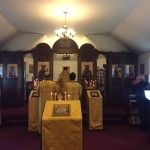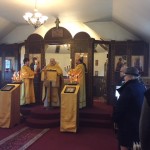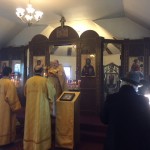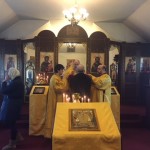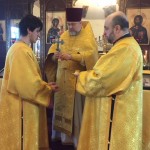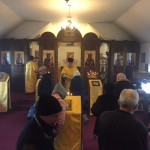On February 3, on the 36th Sunday after Pentecost we had a nice celebration at St. George Church. Our Rector, Archpriest Igor Tarasov served the Divine Liturgy. Following the Gospel lesson he preached the following homily in English:
“The 31st Sunday is practically the last Sunday of our Pentecostal cycle because on the next, 32nd Sunday we will talk about Zacchaeas the publican and start preparing for the Great Fast. Today’s Gospel lesson tells us about the last miracle our Lord Jesus Christ performed before His triumphal entrance into Jerusalem where He underwent His holy Passions. This last miracle was returning the sight to a blind man in Jericho. This event is described by three holy Gospels. Holy evangelist Matthew mentions two blind men, other evangelists – only one. St. Mark tells that the blind man’s name was Bartimaeus. Thus, what is important about him?”
“The Holy Fathers interpret this last miracle before our Lord’s entry into Jerusalem as revealing of the coming of the time of salvation. For this reason the blind man greets Jesus as the “Lord”, the common name for God. He also calls Him “the son of David”, a title deeply rooted in the people’s expectation of the Messiah. The Jews believed that the Messiah was to be born from the heirs of King David.”
“Another important thing is that Jesus knows beforehand what the blind man wants. But He calls him to ask freely that He might answer to that. In the same way our Lord knows beforehand what we want and what we need. But He wants us to express ourselves in prayer, so He might answer us in His mercy. It is not accidental that the Church very often uses and repeats the prayerful words of the blind man: “Have mercy!” “Lord, have mercy!” is the favorite exclamation in the prayers of the Church. The holy tradition says that this prayer was the first prayer of Adam and Eve expelled from the paradise. It is the most ancient prayer. When the Temple of Jerusalem was built the first prayer under its roof was “Lord God, hear us and have mercy!” Sometimes in our services “Lord, have mercy” is repeated 40 times, sometimes even 50 times. Our prayer has to be persistent. Somebody compared such a persistent and repetitive prayer “Lord, have mercy!” to a situation when you fell into a well and try to get out. You cry for help and you don’t stop doing so. You desperately cry for it. In this way we should pray “Lord, have mercy!” many times – asking the Lord for help and mercy.”
“No one should stop or prevent us from asking the Lord for His mercy. The Gospel mentions that the crowd tried to silence the blind man when he asked Jesus for mercy. The multitude warned him that he should be quiet. But he cried out all the more. In our lives many times people or circumstances attempt to silence or to prevent our prayer. Even in the Church we notice how many prayers and services are being abbreviated and simplified. Despite that influence of the world we have to continue praying, keep asking the Lord in our needs. And He will answer our prayers according to the zeal of our faith.”
“We should also keep in mind that our prayers, as well as our hope must be specific. Again, the Lord knew what the blind man wanted from Him the most, yet He asked him, “What do you want Me to do for you?” The man could have asked, “Lord, give me the grace to live with blindness”. Some very spiritually advanced people being blind had a great grace and felt very happy without bodily vision. But the blind man in today’s Gospel asked for the sight. Faith needs to be specific, and Jesus requested to exercise a specific faith and to ask for a certain thing.”
“To conclude we have to understand that our merciful Lord and Savior wishes us to have a firm and persistent faith. Such a faith was found in Bartimaeus, a blind man in Jericho. His faith made him well. If we will have this kind of faith, will be enduring and persistent in our prayers, will be specific in our humble requests, the Lord may grant us what we ask for and make us joyfully follow Him.”
After the dismissal of the Liturgy the Rector preached a short sermon in Russian stressing the main ideas of his English homily. He also congratulated our parishioners Maria and Anton Malyshev on the occasion of their past name days. Traditional Polychronion (“Mnogaia leta!”) was proclaimed.

